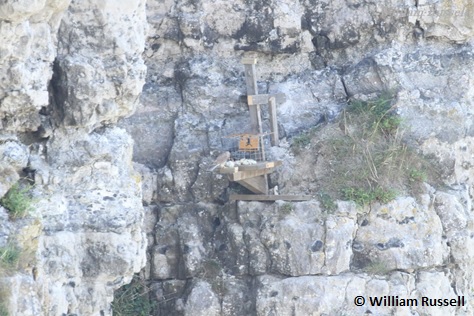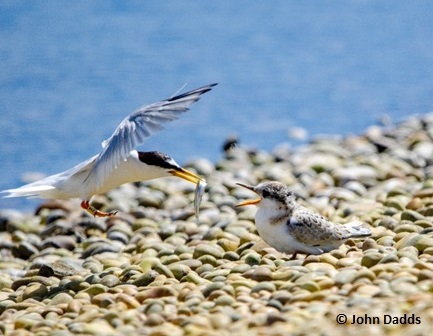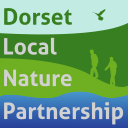Paul Buckley, Dorset LNP Board member and Richard Archer RSPB Chesil Beach Little Tern Project Manager
The Dorset LNP invests a lot of effort in conservation policy and strategy work, but of course actual field delivery of conservation is critical and integral to success. This month we focus on one of Dorset’s rarest and most special birds that we almost lost, and whose recovery helps to meet the Natural Capital element of the LNP’s strategy.
Little terns appear on the Fleet every spring as if by magic. Yet these small birds, each no heavier than a tennis ball, completes an epic five-thousand-mile flight from their Ghanaian wintering grounds to reach our shores. This spring, the first returning birds were spotted on the Fleet on 18th April, an advance party of the fifty or so breeding pairs at Chesil, which by the end of May now form the largest little tern colony on the south coast of England.
The Covid epidemic interrupted a lot of species conservation projects this year, including little tern wardening schemes across the country. The Chesil little tern partnership, led by the RSPB, found itself in early April faced with the prospect of lockdown for the season. The RSPB reluctantly decided not to appoint a project officer and most RSPB staff were furloughed, including Richard as project manager. As the UK began to come to terms with the virus, the RSPB set up an ‘Exceptions Panel’ and agreed that limited intervention at the Chesil colony might be possible, subject to Covid restrictions. In the second half of April therefore, the electric fence surrounding the colony was erected by a small team of volunteers working with non-furloughed RSPB reserves staff. In mid-May Richard was brought back from furlough to explore the ‘art of the possible’ in terms of further interventions, again operating under strict Covid restrictions with the support of Chesil nature reserve and DWT staff. We continued to limit the size of the volunteer work force and put in place strict protocols around social distancing, hand and equipment hygiene and closed the wardens’ beach hide.
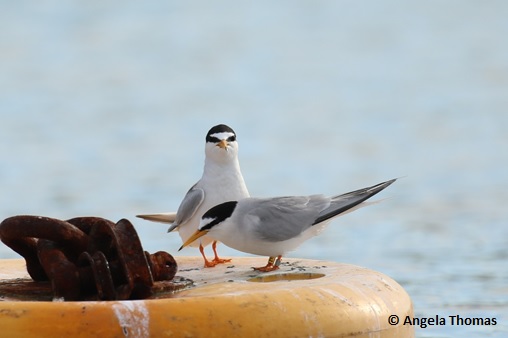
The next step was to explore how we might reintroduce diversionary feeding of local kestrels that in recent years have become the key predator to the colony. In 2019 this wasn’t very effective because we were unable to locate the nesting kestrels on Portland west cliffs. As a result, 88% of all little tern chicks were taken by kestrels, an unsustainable level of predation.
Little terns at Ferrybridge May 2020
This year we successfully located the Portland kestrel nest site and devised a way of feeding them from the clifftop. With the assistance of Marti Hallett, who is a qualified climbing instructor on Portland, we installed a feeding station on the cliff face above the nesting kestrels and fed them for the best part of six weeks. With further loosening of Covid restrictions we began detailed egg and chick monitoring at the colony. The first eggs were laid on 18th May, with the first chicks hatching on 12th June, from which time we also began the annual ringing programme.
This year’s challenges have also been an opportunity to innovate. We introduced a light-sensitive switch to activate the electric fence at dusk and de-activate it at dawn (thereby removing the need for volunteers to do this manually). We re-introduced lengths of plastic drainpipe into the colony and wooden ‘wigwams’, both providing additional cover for young chicks from harsh weather and aerial predators. The biggest innovation by far was the introduction of clifftop feeding of the Portland kestrels: this went very well, with up to 16 food items taken per day at peak to feed a brood of six hungry kestrel chicks.
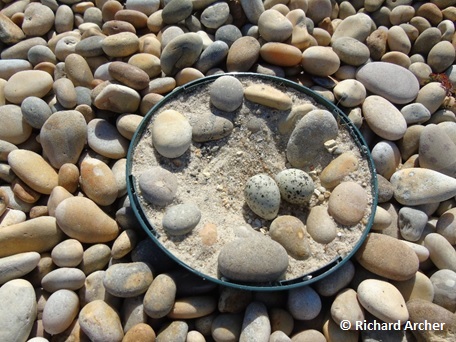
All in all, there’s probably not much more that we could have done in an ‘ordinary’ year. We had fewer wardening slots filled because of our reduced compliment of volunteers, but still managed to have a presence on most days. Significantly, there were far fewer forays by kestrels this year, almost certainly because of our feeding efforts on Portland cliffs. Our final little tern chick fledged on or about 7th August, the last of about 30-plus chicks to fledge successfully this season, which is not a bad return for the team’s efforts.
Little tern nest on artificial sand patch, July 2020
We all held our breath when the Chesil Beach car park re-opened on the May bank holiday. As it turned out, disturbance by people at the colony was minimal, in part because most people followed the signs asking them to divert around the colony, but surely also because most local people know about and respect the colony and its birds, although we can’t be complacent.
We will review the project this autumn to be even better prepared for 2021. Some 20% of the colony now nest regularly outside the fenced area, and while we spend a lot of time relocating nests into the protected area, we would like to extend the fence to incorporate those extra pairs. The colony is situated on common land, so there is however a lengthy consenting process. We have talked at length to project officers at other UK little tern colonies this year and are constantly learning about new and better ways of doing things, and further networking is something we are keen to build on. As recently as the late 1990’s, Chesil supported 100 breeding pairs, so there is room for further colony growth, providing we can continue to get the local environment right for them, and all the signs are that we can.
The Chesil Little Tern partnership comprises the RSPB, Dorset Wildlife Trust and the Chesil Beach & Fleet Nature Reserve (of Ilchester Estate). The project is also funded by Natural England and the Portland Court Leet. Finally, and by no means least, we must pay tribute to our fantastic team of seventeen little tern volunteers this year. We couldn’t have done the intervention work without them and their daily dedication to the project was awesome, so here’s to: John, Tom, Mo, Steve, Nigel, Ron, Bob, Samuel, Will, Angela, Dan, Duncan, David, Neil, Rebecca, Marc and Ali for a fantastic job supporting the project. Yet another nationally important conservation initiative in Dorset.
